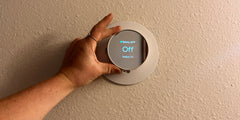Small Changes You Can Make To Preserve Energy At Home This Summer
August 01, 2023 | Kate Cier

As the summer heat intensifies, so does our reliance on air conditioning and other appliances to stay comfortable. Below are some simple tweaks to consider in your everyday routine to reduce energy consumption and contribute to a more sustainable future.
- Optimize Dishwasher and Washing Machine Usage: Running the dishwasher and washing machine during off-peak hours can make a significant difference in energy consumption. In most areas, energy demand is lower during late evenings or early mornings. By scheduling these appliances to operate during these periods, you can take advantage of lower electricity rates and help alleviate the strain on the power grid during peak times.

- Embrace Natural Ventilation: Instead of relying solely on air conditioning, make the most of natural ventilation by strategically opening windows and doors. During cooler hours, early mornings, or late evenings, let fresh air circulate throughout your home. This can help maintain a comfortable indoor temperature without consuming excess energy.
- Utilize Ceiling Fans: Ceiling fans are energy-efficient alternatives to air conditioning, providing a cooling breeze and allowing you to set the thermostat higher. Remember to turn off fans when you leave the room, as they cool people, not spaces. Also, consider using fans in conjunction with your air conditioning to spread cooled air more effectively.
- Invest in Smart Thermostats: Smart thermostats allow you to program and control your home's temperature remotely. I recommend the Nest thermostat. It’s affordable, easy to install, and you can set schedules to efficiently use heat based on foot traffic in your home.
- Opt for Energy-Efficient Appliances: When purchasing new appliances or electronics, look for the ENERGY STAR label. Energy-efficient appliances consume less electricity, helping you save on utility bills and reduce your carbon footprint.

- Shade Windows and Doors: Install blinds, shades, or awnings to block direct sunlight from entering your home during the hottest parts of the day. This prevents your living spaces from overheating and reduces the need for excessive air conditioning.
- When you turn off the lights, also remember to unplug chargers. Many devices continue to draw power even when not in use.
- Be mindful of hot water use. When you can, opt for colder washes and showers. Most water heaters are set to a higher temperature than necessary - lower the temperature to around 120 °F.
- Limit Oven Use: During scorching summer days, avoid using the oven as much as possible. Opt for stovetop cooking, grilling, or preparing cold meals to avoid unnecessary heat buildup in
Not only will these adjustments save you money on utility bills, but they will also contribute to a greener and more sustainable environment for everyone. Embrace these habits not just in summer but throughout the year.


